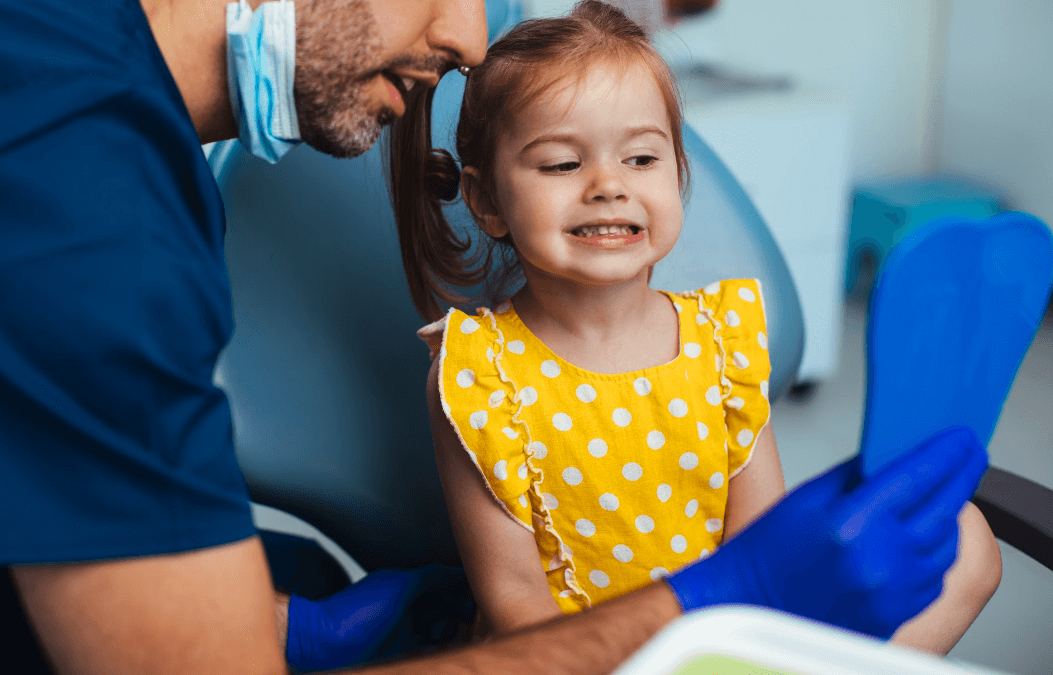How Pediatric Dentists Handle Kids with Special Needs Differently?
Why Specialized Care Matters: Insights from Pediatric Dentists in Las Vegas
The Unique Challenges Children with Special Needs Face in Dental Care
Many children with autism, ADHD, Down syndrome, or physical disabilities may find dental visits overwhelming due to bright lights, unfamiliar sounds, or the sensation of dental tools. In some cases, difficulty with communication or heightened anxiety makes routine cleanings or exams more stressful. These challenges often contribute to delayed appointments, leading to a higher risk of cavities, gum disease, and dental emergencies.
Pediatric Dentists’ Additional Training in Behavioural and Sensory Management
Unlike general dentists, pediatric dentists in Las Vegas receive extra years of specialized training after dental school, focusing on child development, behaviour guidance, and managing care for patients with special health care needs.
Importance of Individualized Care Plans in Las Vegas Clinics
Las Vegas pediatric dental clinics that specialize in treating children with special needs often begin by conducting a detailed intake, including medical history, behavioural triggers, communication preferences, and any past dental experiences.
Some strategies include:
- Scheduling longer or quieter appointments
- Offering sensory-friendly environments (dimmed lights, noise-canceling headphones)
- Using sedation or general anesthesia for complex procedures if needed
- Engaging parents or caregivers as active participants during the visit
Creating a Sensory-Friendly Dental Environment
Quiet Rooms, Dim Lighting, and Other Calming Strategies
Instead of the usual bustling waiting areas or brightly lit treatment rooms, many Las Vegas pediatric dental clinics offer designated quiet rooms. These spaces are designed to minimize distractions and provide a more peaceful setting where children can acclimate at their own pace. Dimmed lights, soft music, and soothing wall colors are all part of the effort to create a tranquil environment.
Use of Weighted Blankets, Noise-Canceling Headphones, and Visual Aids
Las Vegas pediatric dentists often incorporate therapeutic tools like weighted blankets, which can provide a calming, grounding effect for children who are anxious or hypersensitive to touch. Noise-canceling headphones are available to help block out the unfamiliar sounds of dental equipment, which can be distressing for children with auditory sensitivities.
Visual aids—including picture schedules, emotion charts, and social stories—are also used to help children understand what to expect during their visit. These tools reduce uncertainty, give children a sense of predictability, and often lead to smoother, more cooperative dental experiences.
How Las Vegas Pediatric Dentists Reduce Anxiety and Overstimulation
Pediatric dental teams in Las Vegas are trained to identify signs of sensory overload and respond proactively. This might involve giving a child breaks during treatment, adjusting the pace of procedures, or using distraction techniques like fidget toys or ceiling-mounted video screens.
Many clinics also encourage “practice visits” where children can explore the space, sit in the chair, and meet the staff without undergoing any procedures.
Behaviour Management Techniques Tailored to Each Child
Positive Reinforcement, Tell-Show-Do Method, and Desensitization
Pediatric dentists often use positive reinforcement—praising a child’s efforts, offering small rewards, or using stickers and tokens—to encourage good behaviour. These affirmations help children build confidence and feel proud of their participation, no matter how small the step.
Another foundational method is tell-show-do, where the dentist first explains what will happen (“tell”), then demonstrates the tool or process on a finger or toy (“show”), and finally performs the procedure (“do”). This step-by-step approach builds trust and reduces the fear of the unknown.
Desensitization is also common for children who are especially anxious or have had negative dental experiences. This involves gradually exposing them to the dental setting through short, non-invasive visits until they feel comfortable enough to proceed with full treatment.
Working with Parents to Understand the Child’s Triggers
Las Vegas pediatric dentists prioritize collaboration with parents and caregivers to learn about each child’s preferences, fears, and behavioural triggers. Parents are encouraged to share insights on communication methods (e.g., nonverbal cues, favourite calming words or routines), preferred seating positions, and any specific accommodations that have worked in other settings.
When Sedation or General Anesthesia May Be Considered
In some cases, even with the best behavioural strategies, a child may be unable to tolerate dental treatment while awake. Las Vegas pediatric dentists are equipped to assess when sedation or general anesthesia may be the most compassionate and effective option—especially for complex procedures or children with high levels of anxiety, severe sensory sensitivities, or physical limitations.
Options may include:
- Nitrous oxide (laughing gas) for mild anxiety
- Oral sedation for moderate levels of stress
- General anesthesia for extensive procedures or children who cannot safely receive care while conscious
These tools are always used with great caution and under strict safety protocols, with the goal of minimizing trauma and making the experience as positive as possible.
Through tailored behaviour management techniques, pediatric dentists in Las Vegas create a supportive atmosphere that meets each child exactly where they are—ensuring that their dental journey is one of success, comfort, and trust.
Communication Strategies Pediatric Dentists Use
Using Simple Language, Visual Cues, or Non-Verbal Communication
Many children with special needs respond best to clear, concise instructions. Las Vegas pediatric dentists often use simple, concrete language—avoiding complex dental terminology—to explain each step in a way that the child can process.
Visual aids, such as picture cards or step-by-step charts, are commonly used to supplement spoken instructions. These tools help children understand what’s happening and what to expect next. For non-verbal children or those with limited speech, dentists may rely on gestures, facial expressions, or communication boards to exchange information and offer reassurance.
Some clinics even utilize augmentative and alternative communication (AAC) tools, like tablets or picture exchange systems, to help children express themselves during visits.
Involving the Child at Their Comfort Level
Las Vegas pediatric dentists know that not every child is ready to fully participate right away. That’s why they emphasize meeting each child where they are—giving them choices when possible (e.g., “Do you want to hold the mirror or have me hold it?”), offering frequent breaks, and validating their feelings throughout the appointment.
This approach helps build a sense of control and confidence. Even if a child can’t communicate traditionally, being included in the process—whether through eye contact, gestures, or familiar routines—empowers them and fosters trust.
Collaborating with Speech Therapists or Occupational Therapists if Needed
When communication barriers are more complex, Las Vegas pediatric dentists may collaborate with speech-language pathologists (SLPs) or occupational therapists (OTs) involved in the child’s overall care. These professionals can provide insight into the child’s communication methods, sensory processing preferences, and behavioural triggers.
By working as part of an interdisciplinary team, pediatric dentists are able to fine-tune their communication strategies and create a seamless, supportive experience that aligns with the child’s broader developmental goals.
Choosing the Right Pediatric Dentist in Las Vegas for Special Needs Care
• What to Look For: Certifications, Experience, and Accessibility
Start by looking for board-certified pediatric dentists, as they have advanced training in child development and special needs dentistry. Dentists who are members of organizations like the American Academy of Pediatric Dentistry (AAPD) often have the latest knowledge in behavioural techniques, sedation options, and patient-centered care.
Experience matters—seek out a clinic that regularly treats children with autism, ADHD, sensory processing disorders, or other developmental or physical disabilities. Also, consider accessibility features, such as wheelchair access, quiet rooms, and flexible scheduling for longer or low-stimulation appointments.
• Questions Parents Should Ask When Booking a First Appointment
To ensure the dentist is the right fit, consider asking:
- “How do you tailor your approach for children with special needs?”
- “Do you offer desensitization or practice visits?”
- “What accommodations can you make for sensory sensitivities?”
- “What is your policy on parental involvement during procedures?”
- “Are your staff trained in behavioural and communication techniques?”
These questions can help you evaluate the clinic’s readiness and willingness to support your child’s unique needs.
• Trusted Las Vegas Clinics Known for Serving Children with Special Needs
Several pediatric dental practices in Las Vegas are known for their work with special needs children. These clinics often highlight their sensory-friendly environments, patient-focused care plans, and interdisciplinary collaboration with therapists and caregivers.
While it’s best to research and consult reviews or parent referrals, clinics that emphasize inclusive care, flexible appointment options, and strong communication are generally a good starting point.






